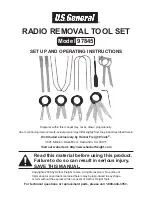
Chevrolet/GMC Express/Savana CNG Compressed Natural Gas Supplement
(GMNA-Localizing-U.S/Canada-9159237) - 2016 - crc - 6/18/15
10
Driving and Operating
use with CNG are included with the
vehicle. See an authorized GM
dealer for additional O-rings.
{
Warning
Attempting to fill a CNG fuel
system that has a missing or
damaged O
‐
ring is dangerous.
Natural gas can leak. If the
natural gas is ignited, you or
others could be injured. Replace
the O
‐
ring before filling the tank.
To replace the fill valve O-ring:
1. Carefully remove the O-ring
from the groove in the fill valve.
A small flat-blade or pointed
tool can be used.
2. Make sure the groove is clean
and free of dirt and debris.
3. Install the new O-ring in the
groove in the fill valve. Make
sure the O-ring is properly
seated in the groove.
Refueling will stop automatically
when the tank is full. To disconnect
the vehicle from the refueling
station, remove the nozzle from the
fill valve. A hissing sound may be
heard as a small amount of natural
gas escapes. This is normal.
If dirt or other debris is adhering to
the inside of the fuel fill valve, gas
may leak out after refueling. If more
fuel is needed, repeat the refueling
procedure.
Put the fill valve dust cap on
securely and close the fuel
filler door.
Pressure Relief Devices
The CNG tank has pressure relief
devices that are designed to release
pressure if the CNG tank is
overheated or over pressurized.
{
Warning
If the pressure relief devices
release CNG while the vehicle is
being operated, the CNG tanks
will be emptied and it will run out
of fuel. If a release of CNG is
detected, move the vehicle to a
(Continued)
Warning (Continued)
safe stopping location. A loud
rushing noise may be heard when
the CNG is released.
If a pressure relief device
releases CNG while the vehicle is
not running, it is possible that not
all tanks will be emptied. Do not
start the vehicle.
Have the vehicle towed to an
authorized GM dealer for service.
In Case of a CNG Leak
If a CNG fuel leak is suspected, see
Fuel System Leak
{
Warning
Fuel vapors and fuel fires burn
violently and can cause injury or
death.
(Continued)












































